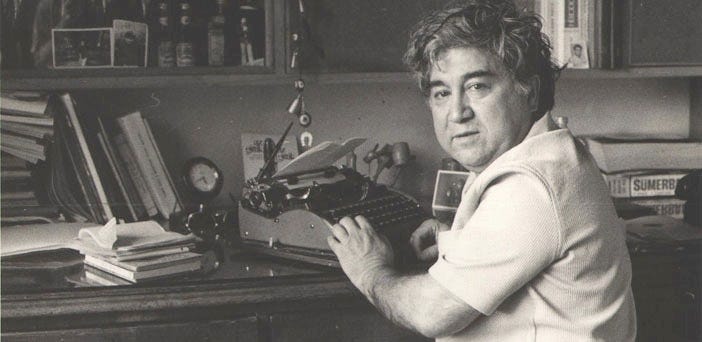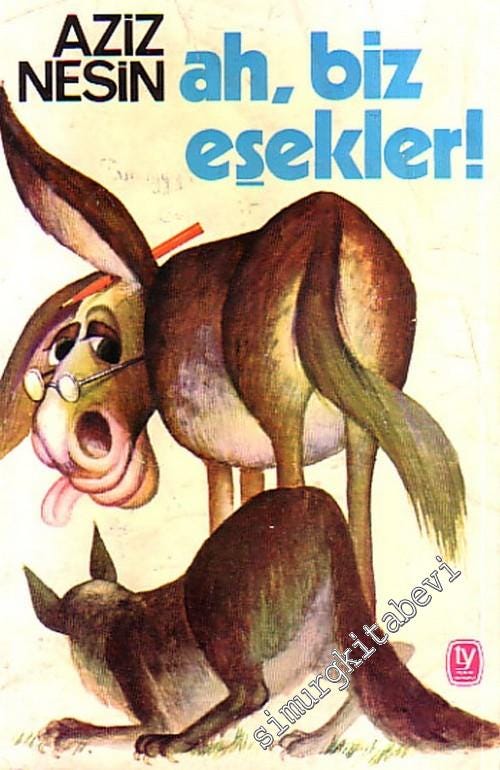Hi folks,
I keep saying that I’m not going to write about Turkish domestic politics, but it keeps catching up with me. I’ll have something to say about the İmamoğlu arrest and the subsequent events in a day or two, but today I’ll leave you in Nick’s hands, who has translated a short story by the legendary Turkish satirist Aziz Nesin.
It’s a timely piece to read, not just against the backdrop of Turkish politics, but also against that in the United States and Europe.
-Selim
Since Trump first ran for office in 2016, there's been an odd alliance of centrists, contrarians and folks on the far left committed to the claim that everyone else was being hysterical about Trump. They insisted that the threat he posed to American democracy was exaggerated, and that the people pointing it out were alarmists. In the pages of the New York Times and The Atlantic, this often took the form of authors suggesting that yes, right wing authoritarianism was a threat, but wasn’t it just a reflection of the equally illiberal threat posed by woke college kids? For the far left, by contrast, denouncing Trump as a fascist was just a scare tactic, hyperbolic rhetoric from a discredited Democratic Party seeking to compel support for centrist candidates. Underlying both these positions seemed to be a stubborn sense that calling someone who was so obviously a threat to democracy a threat to democracy just wasn’t clever enough. There had to be a more sophisticated take.
Even after Trump tried to steal the 2020 election, even after he ran again in 2024 spelling out all the undemocratic things he wanted to do, the “you’re overreacting” folks remained too cool to get concerned. Having staked out their positions so publicly, they kept searching out evidence for their priors even as it became increasingly difficult to find. Now, with Trump back in office running rampant over the constitutional order, a few of are beginning to reconsider. Meanwhile, Democratic politicians like Chuck Schumer remain committed to giving Trump the benefit of the doubt a little bit longer. And last I checked,
, a guy who started his career chastising people for calling Erdoğan undemocratic, was still going strong.Watching this discussion play out in America as Erdoğan took the final steps to consolidate his authoritarian rule in Istanbul, I was reminded of an old Aziz Nesin story. Nesin’s career as a satirist spanned the second half of the 20th century. But this one is from 1958, when Nesin believed his fellow intellectuals had waited until too late to criticize the Democratic Party’s assault on civil liberties. It’s not one of Nesin’s more subtle works, but the raw anger feels appropriate. As in some of Saki’s short stories, there seems to be a moment where even humorists boil over, their sarcasm becomes literal, and they start imagining their targets torn apart by wild animals.

Among other things, Nesin’s career demonstrated that you could be a committed contrarian without losing your moral bearings. At age 78, Nesin narrowly escaped death in the Madımak massacre after publishing a Turkish translation of Salman Rushdie’s Satanic Verses. Needless to say, as two outspoken intellectuals who both faced death for their commitment to free speech, Rushdie and Nesin hated each other. Nesin thought Rushdie was a charlatan. Rushdie wanted to know why Nesin wasn’t paying royalties for his translation. That’s true contrarianism, not the glib cant that gets you a column in the Atlantic.
So, in honor of Chuck Schumer, Sam Moyn and Shadi Hamid, here’s Aziz Nesin’s “Oh, Us Donkeys.”
Oh, Us Donkeys!
You won’t believe it, but we donkeys used to speak like you people. We had our own language. Our speech was musical and harmonious and sweet to the ear. How beautifully we talked, what songs we sang. But since we were donkeys, we spoke the language of donkeys, not people.
We donkeys didn’t used to bray, we only started braying later. How did it happen that our rich language died and we started to bray? Are you curious? If you are, I’ll tell you.
In short, our tongues froze. A frightening event drove us mad and our tongues froze and we completely forgot our language. Since then we’ve had to articulate all our feelings by braying, using just two long syllables.
Us donkeys losing our tongues happened long ago. There was an aged donkey from the old generation. He ate grass and sang songs. One day he smelled something. It wasn’t a good smell. It was the smell of a wolf…
This old donkey lifted his nose in the air and inhaled deeply. The air smelled pungently of wolf. “No, no, that’s not a wolf,” the old donkey reassured himself and went back to grazing. As time passed the smell of the wolf grew stronger. It was clear a wolf was approaching, and a wolf approaching meant death was approaching.
At this point as the donkey was grazing and a sound came to his ears. But it wasn’t a good sound. It was the sound of a wolf. The old donkey perked up his ears to listen to the sound. Yes, it was the sound of a wolf. “That’s not a wolf. It can’t be the sound of a wolf. Maybe it’s a camel or an elephant.”
The unnerving sound had grown closer. The donkey said to himself, “No, no, this shouldn’t be a wolf. Does a wolf have nothing better to do besides come here?”
Yet his heart was seized with fear and his eyes were scanning the horizon. When he looked at the top of the mountain across from him he saw, in the clouds and the mist, a wolf. “Ah,” he said, “what I see can’t be a wolf. It must be something else.” And he thrust his head back into the grass. “It seemed that way, I was seeing things. Yes, certainly seeing things.”
A little later, when he saw a wolf running through the bushes, his fear grew. But because he didn’t want a wolf to appear, he kept trying to deceive himself. Between them only a few hundred donkey-paces remained. “God willing this creature I see in front of me isn’t a wolf. Why should it be a wolf? Maybe a camel, maybe an elephant. Maybe something else, maybe nothing. I’ve started to think everything is a wolf.”
The grinning wolf came closer and closer. When just a few paces remained the tired donkey began to run. The wolf ran after him. The donkey was still saying “What a fool I am. I thought this wild cat was a wolf and I’m running away from it. But no, it’s not a wolf.”
The donkey ran and the wolf pursued. Hearing the wolf’s angry panting at his tail, the old donkey said to himself, “I’d wager this isn’t a wolf. The creature I hear panting at my tail can’t be a wolf.”
The wolf’s claw tore into the donkey’s right haunch and he was thrown to the ground. “I know, I know, this isn’t a wolf. My rear is ticklish. I don’t like practical jokes.”
The ravenous wolf bit into the donkey’s rump with his teeth and tore off a chunk of flesh. Writhing on the ground in acute pain, the donkey’s tongue suddenly froze. From fear, he suddenly forgot the donkey language he knew. The wolf attacked his neck and his throat. Blood spurted from his body. And finally, at that moment, the donkey began to scream:
“He was a wolf. Aaah! He was a wolf. Aaah!”
The wolf tore him apart and because his tongue was still frozen he just cried:
He… Aaah. He… Aaah!
And as that old donkey was torn apart by the wolf’s teeth, all the other donkeys heard his ear-splitting cries:
Hehaw! Hehaw!




